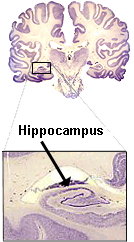Neuroscience For Kids
 Long-term Use of Ecstasy May Damage the Hippocampus
Long-term Use of Ecstasy May Damage the Hippocampus
May 17, 2011
According to new research from scientists in The Netherlands, long-term users of the drug ecstasy risk damage to the area of their brains called the hippocampus.
The hippocampus is critical to the complex processes of forming, sorting, and storing memories. Damage to the hippocampus can lead to problems forming new memories. Research has demonstrated that ecstasy use can lead to memory problems, but there had been no studies to investigate how ecstasy affected the hippocampus.
The Dutch scientists compared the volume of the hippocampus in 10 male ecstasy users (average of 281 ecstasy tablets taken over 6.5 years) to the volume of the hippocampus in 7 male, age-matched control subjects who never took ecstasy. The researchers discovered that the volume of the hippocampus was 10.5% smaller in the ecstasy users compared to that in the control subjects.
Brain differences were not confined to only the hippocampus. After correcting for total brain volume, the researchers found that overall grey matter volume was 4.6% smaller in ecstasy users compared to that in control subjects.

These data suggest that damage to the hippocampus may explain some of the memory problems suffered by people who take ecstasy. Future work may show whether this damage is permanent and perhaps provide treatment strategies to help people who suffered from this type of brain damage.
References and more information:
- den Hollander, B., Schouw, M., Groot, P., Huisman, H., Caan, M., Barkhof, F. and Reneman, L., Preliminary evidence of hippocampal damage in chronic users of ecstasy, J. Neurol. Neurosurg. Psychiatry, doi:10.1136/jnnp.2010.228387, 2011.
- Ecstasy - Neuroscience for Kids
- MDMA, Ecstasy - National Institute on Drug Abuse
Copyright © 1996-2011, Eric H. Chudler, University of Washington
